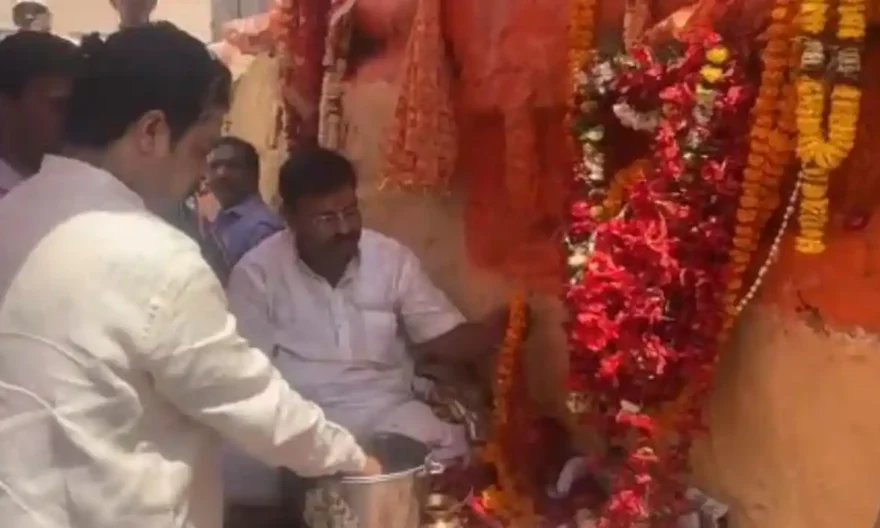
The Allahabad High Court today will hear a petition by the mosque committee against the demand for permission for regular worship of Shringar Gauri in the Gyanvapi premises.
The Allahabad High Court on Thursday told by
Muslim side that the Hindu’s suit is not maintainable under the Worship Act, 1991. Rule 7 Rule 11 was argued from the side of the Muslim side. The Allahabad High court had asked the government on Wednesday that how the worship stopped in Shringar Gauri? Additional Advocate General MC Chaturvedi and Chief Permanent Advocate Bipin Bihari Pandey, on behalf of the Uttar Pradesh government, said that the government has nothing to say at present on the status of the application under Order Seven Rule 11.If the court orders, the government will present its stand, he added
The hearing in the regular worship of Shringar Gauri which took place on Thursday will continue on Friday as well.
Earlier on December 16, Appearing for Hindu side advocate Vishnu shankar Jain told Allahabad High Court that under Article 254(2) of the law made by the Center and the State regarding the concurrent list, the state law will be considered effective.
Vishnu Shankar Jain also said that the Uttar Pradesh Kashi Vishwanath Act passed by the state assembly has the ownership of the Vishwanath temple on the Gyanvapi campus.
On December 15, Appearing for Hindu side Advocate Vishnu shankar Jain on told Allahabad High Court that the demolition of the temple does not end its existence.That place will always be considered as a temple because the place of the deity never changes.
On December 14, Senior advocate Harishankar Jain and Vishnu Jain argued on behalf of the Hindu side. The counsel for the Hindu side claimed in the court that the entire Gyanvapi complex belongs to the Vishwanath temple area. In the Din Mohammad case, only prayers were allowed under the domes. Ownership was not given.
Vishnu shankar Jain also told the Allahabad high court that the case was not barred by the Waqf Act as Aurangzeb had never declared it a Waqf property.
On December 8, Hari Shankar Jain, the counsel representing the Hindu side in a Kashi Vishwanath-Gyanvapi mosque case, had submitted an old map of the Vishweshwar temple to the Allahabad High Court.
Hari Shankar Jain, the counsel representing the Hindu side in a Kashi Vishwanath-Gyanvapi mosque case, claimed in the Allahabad High Court that The existence of a temple on the disputed site in Varanasi and its demolition to build a mosque is mentioned in religious and history books.
Hari Shankar Jain also argued that the Vishweshwar temple map was made by the then District Magistrate James prinsep in British times 1836. He also explained about map. He also submitted plan of the old Vishweshwar temple.
Hari Shankar Jain also explained about old Vishweshwar temple.
where there are three domes and Shringar Gauri, Ganesh and Dandapani Mandap, the idol was established there, which was being worshipped. It was closed in 1993 whereas, before this regular worship of Shringar Gauri continued, Jain reiterated the old history of the temple in his argument.
On December 5, Hindu side advocate Harishankar Jain argued that the Shivling in Kashi was established by Lord Shiva himself, that is why it is called Swayambhu. It is also described in the Kashi section.
The Hindus has been worshiping Shringar Gauri since before 1947. He has only demanded the right of worship, which does not violate any legal right of the petitioner. In Islamic law, worship on other’s property is not accepted.
Vishnu Shankar Jain also drew the attention of the court towards the mythological facts and the decisions of the court. Said, there is a detailed description of it in Adhyay 99 and 100 of Skanda Purana, Shloka numbers 61 to 70. It has been proved in this order that the Vishweshwar Nath temple was damaged during the time of Muhammad Ghori and Mughal ruler Aurangzeb. The court adjourned the hearing of the case till Tuesday.
On 30 November, the Gyanvapi mosque management committee concluded its argument on its plea challenging a Varanasi court order on the maintainability of the case filed by five Hindu women who sought permission to offer regular prayers to idols of deities in the mosque compound.
Earlier, Senior advocate SFA Naqvi, argued that the Waqf Act and the Places of Worship Act of 1991 were mainly cited by the arrangement committee of the mosque. The arrangements committee of Gyanvapi Masjid has made Rakhi Singh as well as 10 people, including the five plaintiff women and the UP government, parties in this case.
The mosque’s arrangement committee has filed a petition in the Allahabad High Court against the verdict of the Varanasi district in which the court had rejecting the objection of the Muslim side.
The Varanasi district court had on September 12 dismissed a plea by the mosque committee Anjuman Intezamia Masjid (AIM) which challenged the maintainability of the suit filed by the five Hindu plaintiffs.
A total of five petitions related to the Gyanvapi dispute of Varanasi are filed in the Allahabad High Court.
Last year, five women, including Rakhi Singh, had filed a petition in the district court of Varanasi, seeking permission for regular worship of Shringar Gauri in the Gyanvapi campus.




